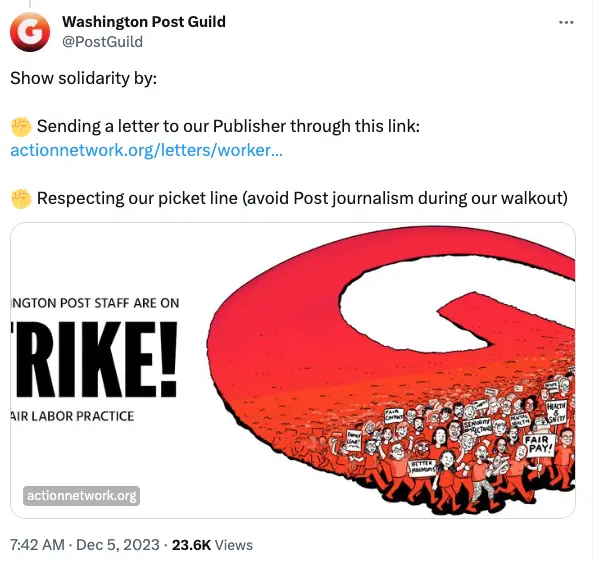- cross-posted to:
- usa
- unions@sh.itjust.works
- cross-posted to:
- usa
- unions@sh.itjust.works
They’ve asked that people honor the picket line by not engaging with Washington Post content on Dec. 7:

I always wonder what a 24 hour strike is supposed to achieve. It seems like striking for 24 hours demonstrates that you have a lack of commitment to the issues and will only embolden management to continue as it has been.
It’s a demonstration of “power”. For example if it were 100% effective then the organization would notice a 100% drop.
Imagine if you were a company that made donuts. You wake up at 4am every morning to ensure donuts are ready for your customers at 6am. You make all different varieties and you make them coffee and then you open the doors and… nothing.
You wonder at first of you’ve set your clocks right. Was it daylight savings? Maybe there is traffic? 6am turns to 7am. No one. You sip your cup of coffee. 7am turns to 8am. Should you make a new pot of coffee? No one has come in yet, you don’t want to waste it. 8am turns to 9am. What are you going to do with so many donuts? You’ve eaten 4 already. 9am turns to 10am. Maybe you can give some away, but who needs several hundred donuts? 10am turns to 11am. All your coffee and food is going to go to waste. 11am turns to noon. Into the trash it goes. You can give away some, but what a waste. You can’t run a business like this. Making donuts that no one will buy.
Luckily it was just a 24 hour strike. The next day you probably have even better business than usual. Heck maybe you even had better than usual the day before. But that one day. That one day was a waste. That one day was terrifying. That one day was a signal.
Sure, you can recover from that one day. But if someone comes to you and says we can make that one day into two days. We can make that one day into a week. Into a month. Into a year. You listen.
You start small. You negotiate in good faith. The company shows their hand. The union shows their hand. You talk it out. Everyone wants to make money. We can figure it out, together.
Your donut example is describing a boycott, not a strike. If it were a strike, who exactly is making the donuts and coffee? Boycotts are fun too, but the dream of a strike would go slightly differently.
If we stick with the donuts example, you’d show up at your donut shop at 4am again, where you normally have, say, 10 employees. Since they’re on strike, they don’t come in to help out. By 6am you have roughly a quarter of the day’s donuts made, and customers are starting to stream in.
Since you’re alone, you have to stop making donuts to help customers, which means that while you’re already running behind, now you start to slip even further behind schedule to accommodate the morning rush. By 7 am, you’ve sold almost all of the donuts you’ve already prepared, but you can’t make more because you’re busy making coffee and helping customers.
At 7:30 you run out of donuts entirely - right before the morning rush. Customers keep coming in and asking to buy donuts, but you have to let them know that because you’re stubborn and don’t want to compensate your workers fairly, they’re on strike today. This brings grumbles from your customers as they realize that they’ll need to disrupt their morning routine to find an alternative.
By 8am you’ve given up on the day and hang up the “closed” sign, further driving loyal customers into the arms of your competitors. Maybe some of those people will be back first thing tomorrow, but maybe some of them decide that another option is just as good, and certainly more reliable.
You lose out on most of a day of business and potentially take a hit to your reputation as a business. The short term impact is measurable and notable, but it’s the threat of the long term impact that looms over you as you reconsider negotiations.
Otherwise I agree with you completely - negotiate with all stakeholders in good faith and be willing to make sacrifices. Everyone wants to make money here, and everyone deserves enough money to live off of.
This is a great narrative explanation.
The Washington Post, NY Times and L.A. Times are some of the few organizations that foresaw the move to digital and are very profitable, while local newspapers laughed at anyone who told them in the 90’s and 2000’s that they needed to adapt, and those local papers are now disappearing (while still maintaining that the ‘internet is a trend and not real publishing’).
So, the smart business moves of the Post makes them one of the existing news media companies employing actual journalists that is making money. They can pay their staff accordingly to maintain that position.
Importantly: the family which owned the Washington Post during the time when they made that shift has since sold to Jeff Bezos. The Post could pay journalists very nicely out of his pocket change.
Who owns the company is irrelevant in the fight for fair wages and working conditions.
There’s no need for a business owner to pay employees out of their own pockets, that’s not a sustainable business, regardless of whether it’s Bezos or just a garage owner with two employees. The Post, as a business runs profitably just fine on its own, with more than enough revenue to pay their employees fairly.
He could turn it into something like the Guardian, where it runs on an endowment. And it would be a trivial expense for him, with money he can’t actually spend on himself over the course of his life.



